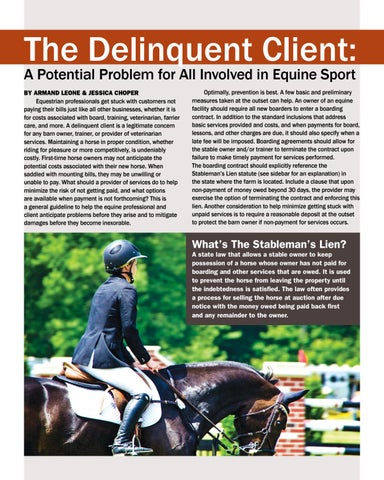88 • THE PLAID HORSE
The Delinquent Client: A Potential Problem for All Involved in Equine Sport BY ARMAND LEONE & JESSICA CHOPER Equestrian professionals get stuck with customers not paying their bills just like all other businesses, whether it is for costs associated with board, training, veterinarian, farrier care, and more. A delinquent client is a legitimate concern for any barn owner, trainer, or provider of veterinarian services. Maintaining a horse in proper condition, whether riding for pleasure or more competitively, is undeniably costly. First-time horse owners may not anticipate the potential costs associated with their new horse. When saddled with mounting bills, they may be unwilling or unable to pay. What should a provider of services do to help minimize the risk of not getting paid, and what options are available when payment is not forthcoming? This is a general guideline to help the equine professional and client anticipate problems before they arise and to mitigate damages before they become inexorable.
Optimally, prevention is best. A few basic and preliminary measures taken at the outset can help. An owner of an equine facility should require all new boarders to enter a boarding contract. In addition to the standard inclusions that address basic services provided and costs, and when payments for board, lessons, and other charges are due, it should also specify when a late fee will be imposed. Boarding agreements should allow for the stable owner and/or trainer to terminate the contract upon failure to make timely payment for services performed. The boarding contract should explicitly reference the Stableman’s Lien statute (see sidebar for an explanation) in the state where the farm is located. Include a clause that upon non-payment of money owed beyond 30 days, the provider may exercise the option of terminating the contract and enforcing this lien. Another consideration to help minimize getting stuck with unpaid services is to require a reasonable deposit at the outset to protect the barn owner if non-payment for services occurs.
What’s The Stableman’s Lien? A state law that allows a stable owner to keep possession of a horse whose owner has not paid for boarding and other services that are owed. It is used to prevent the horse from leaving the property until the indebtedness is satisfied. The law often provides a process for selling the horse at auction after due notice with the money owed being paid back first and any remainder to the owner.
